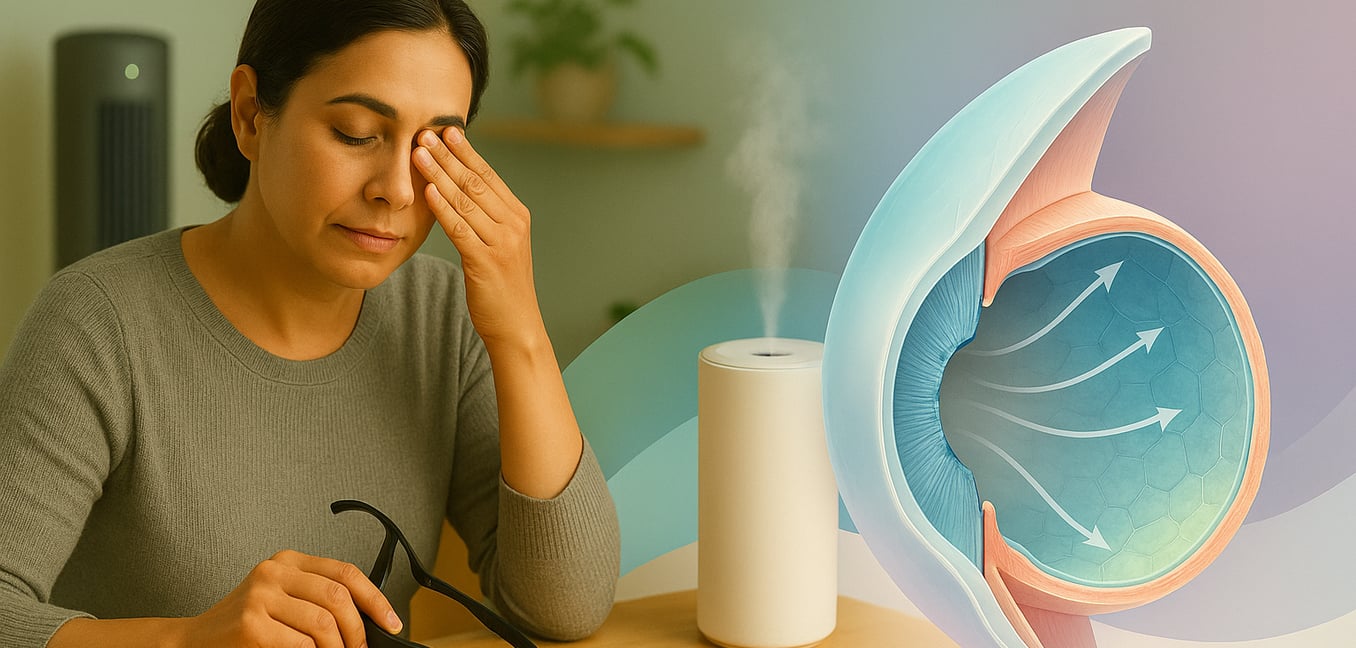Managing Fuchs' Dystrophy: A Guide to Lifestyle and Self-Care
Fuchs' dystrophy is a progressive condition where the cornea's inner cell layer, the endothelium, gradually deteriorates. This damage leads to corneal swelling, which causes blurred or hazy vision, especially in the morning. While there is no cure, a proactive approach that combines medical treatment with key lifestyle adjustments can help manage symptoms, slow progression, and protect your overall eye health. This guide focuses on practical strategies you can adopt to support your vision and quality of life.
Protecting Your Eyes from Daily Stressors
Your daily environment contains elements that can put extra stress on a compromised cornea. Taking simple, proactive steps to shield your eyes is a fundamental part of managing your condition and maintaining comfort.
-
Shield from UV Light: Always wear high-quality sunglasses labeled "UV400" or "100% UV protection" when you are outdoors, even on cloudy days. UV radiation is a major source of cellular stress that can harm the cornea's delicate endothelial cells. For extra defense, a wide-brimmed hat provides a physical barrier against direct and reflected sunlight.
-
Improve Indoor Air Quality: Dry air from heating or air conditioning can worsen eye discomfort. Use a humidifier in your home or office, particularly where you spend the most time, to add moisture to the air. Using a high-efficiency particulate air (HEPA) filter can also help by trapping airborne irritants like dust, pollen, and pet dander.
-
Manage Your Digital Environment: Staring at screens often leads to less frequent blinking, causing dryness and strain. Practice the 20-20-20 rule: every 20 minutes, look at something 20 feet away for at least 20 seconds. Use preservative-free artificial tears to keep your eyes lubricated and adjust your screen’s brightness to match the lighting in your room.
-
Avoid Physical Irritation: A cornea with Fuchs' dystrophy is more fragile and prone to painful abrasions. It is crucial to avoid rubbing your eyes. When washing your face or using household chemicals like cleaning sprays, be gentle and turn your face away to prevent accidental contact or injury.
Supporting Corneal Health from Within
The health of your entire body influences the environment of your eyes. Focusing on nutrition and key lifestyle factors can help reduce systemic inflammation and oxidative stress, providing foundational support for your corneas.
-
Embrace an Antioxidant-Rich Diet: Antioxidants help protect your body's cells from damage. Build your meals around a "rainbow" of colorful fruits and vegetables. Dark leafy greens like spinach provide lutein and zeaxanthin, citrus fruits and berries are packed with vitamin C, and nuts and seeds offer vitamin E.
-
Incorporate Healthy Fats: Omega-3 fatty acids are known for their anti-inflammatory properties and can improve symptoms of dry eye, which often accompanies corneal conditions. Good sources include fatty fish like salmon and mackerel, as well as plant-based options like flaxseeds, chia seeds, and walnuts.
-
Maintain a Healthy Weight: Studies show a strong connection between a higher body weight and the corneal swelling that causes blurred vision in Fuchs' dystrophy. This research suggests that maintaining a healthy weight through a balanced diet and regular exercise can be a powerful step in reducing your risk of more severe symptoms.
-
Quit Smoking for Cellular Health: Smoking is a primary source of oxidative stress, which damages cells throughout your body, including the fragile cells of your cornea. Quitting smoking is one of the best things you can do to support your circulation, reduce cellular stress, and improve your body's ability to maintain healthy tissue.
-
Prioritize Hydration: The cornea's clarity depends on a precise fluid balance. While drinking more water won't cure the condition, staying well-hydrated supports all your body's functions and helps maintain a stable and healthy tear film. This keeps the eye surface lubricated and less prone to irritation.
Partnering with Your Doctor: The Foundation of Management
Lifestyle adjustments are powerful tools, but they are most effective when they supplement professional medical care. A strong partnership with your ophthalmologist is the cornerstone of successfully managing Fuchs' dystrophy.
-
Attend Regular Eye Examinations: These appointments are critical for tracking the health of your cornea. Your doctor will use specialized tools to measure corneal thickness and count your endothelial cells. This data allows for early detection of changes and informed decisions about your treatment plan.
-
Follow Prescribed Treatments Diligently: If your doctor prescribes hypertonic saline, use the drops or ointment exactly as directed. These special saltwater solutions help pull excess fluid out of the cornea, reducing the swelling that causes blurriness. Using an ointment at night is often recommended for a sustained effect, helping you wake with clearer vision.
-
Understand Your Surgical Options: For advanced cases where vision is significantly impaired, surgery can restore clarity. Modern techniques like DMEK and DSEK involve replacing only the diseased inner layer of the cornea with healthy donor tissue. These targeted procedures offer faster recovery and better visual outcomes than older, full-thickness transplants. Your doctor will discuss if and when surgery is the right option for you.










